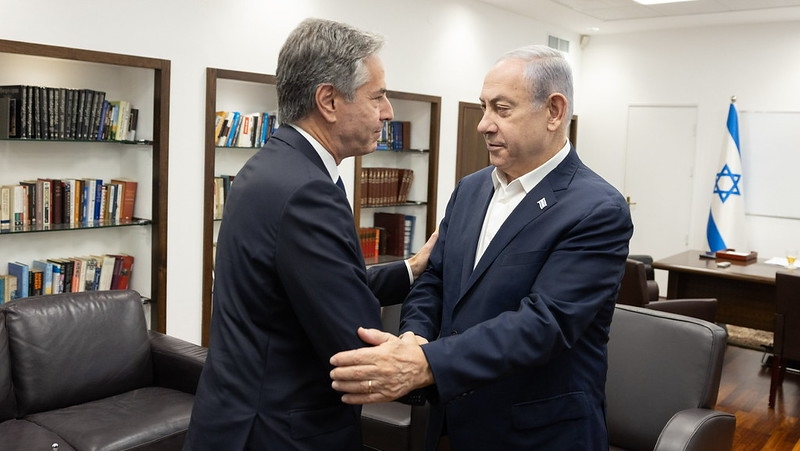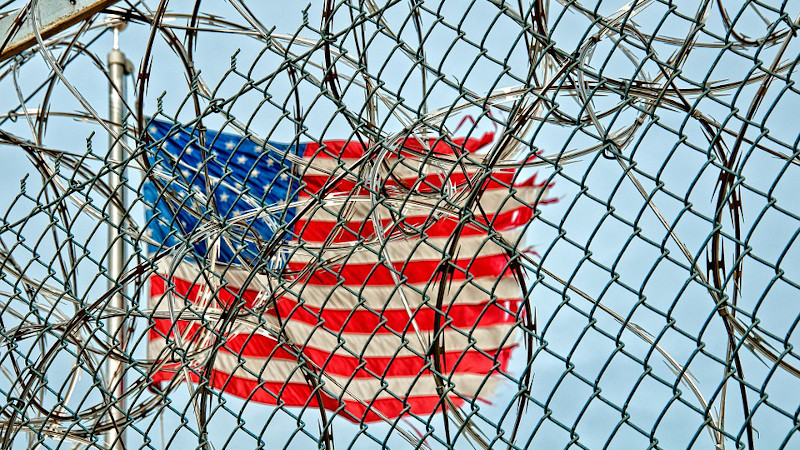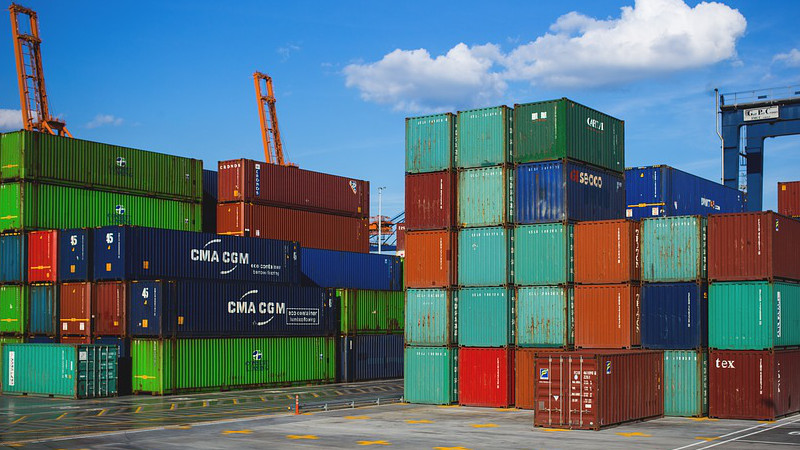

By Robert Mason
(FPRI) — The Hamas incursion from Gaza into Israel and the subsequent attack on Israel’s Southern District that began on October 7, 2023, led to the death of more than 1,500 Israelis and foreigners. The atrocities, widely reported as Israel’s 9/11, have been met with international condemnation, along with support for Israel, especially from the United States. Secretary of State Anthony Blinken traveled to the Middle East, followed by President Joe Biden, who traveled to Israel on October 18, 2023. He hugged Prime Minister Benjamin Netanyahu and Israeli President Isaac Herzog on the tarmac immediately after Air Force One landed. Since then, the United States has moved warships and aircraft into position adjacent to Israel along with 2,000 troops to “provide intelligence and surveillance, transportation and medical assistance.”
However, David Petraeus, who served as CIA director, as well as commander in Iraq and Afghanistan in the years after 9/11, and Biden, have both urged Israel not to repeat US mistakes during its so-called “War on Terror.” These mistakes are often cited as a lack of post-war planning and state-building in Iraq and Afghanistan, as well as human rights abuses. Similar to both wars, the war against Hamas lacks a military solution and requires a diplomatic approach. This needs to be considered sooner rather than later, before more than two million lives are put at risk by Israel’s ground invasion of Gaza and regional escalation becomes a manifest reality.
At the time of the incursion, Hamas announced that it had also taken around 199 hostages back into Gaza. The group has since released two US hostages on October 21 (through a combination of US and Qatari diplomacy), and two more on October 23. Following the beginning of an Israeli ground offensive into Gaza, an Israeli soldier was freed on October 31. However, Hamas stated on November 4 that more than sixty hostages were missing after Israeli air strikes, highlighting the role that mediators or a prisoner swap might play in securing the release of the majority of hostages and thereby helping to resolve the immediate rationale for the invasion of Gaza.
There have already been devastating air strikes on Gaza resulting in more deaths than the original Hamas attack. More than 9,000 Palestinians had lost their lives as of November 3, many of them children. In one air strike on the Al-Ahli Arab Hospital on October 17, at least 500 people were killed, although it is still not clear which side is responsible for this. Israeli air strikes have taken place in the West Bank (including against a mosque in Jenin which Israel says was being used by Hamas and Palestinian Islamic Jihad to plan attacks) and Syria. On November 4, Israel attacked an ambulance convoy said to be transporting Hamas fighters. Israeli airstrikes in supposed areas of safety in the South of Gaza have led the United Nations and other aid agencies to claim that nowhere is safe for civilians in Gaza. Such actions raise questions about proportionality in Israel’s right to defend itself from future attacks, the conditions in which Gazans have been forced to live in for decades, widely regarded as being an “open air prison,” and discrimination of military versus civilian targets under international humanitarian law during what is expected to be a complex counter-insurgency campaign. An Israeli red line was finally crossed when right-wing Jerusalem Affairs and Heritage Minister Amichai Eliyahu suggested dropping a nuclear weapon on Gaza as “an option.” He was subsequently suspended by Netanyahu, but only temporarily, given that this exceeded the prime minister’s authority.
Neither international diplomacy nor the prospect of regional conflict, primarily vis-à-vis Hezbollah in Lebanon, and/or against the Quds Force in Syria and Iraq, is expected to constrain Israel’s use of force. Hezbollah’s secretary-general, Hassan Nasrallah, congratulated Hamas on the surprise attack but stopped short of declaring military support and is keeping the situation under review. Iran is unlikely to directly intervene in the Gaza war given the options it has and its broader regional and regime survival interests. But Iran-aligned Houthis in Yemen have already targeted the Israeli Red Sea town of Eilat, threatening the prospects for peace in Yemen.
Initial Israeli military action and the anticipated US veto of a Brazil-sponsored draft UN Security Council resolution that called for a “humanitarian pause” has already led Jordan to cancel a summit involving Biden, Egyptian President Abdel Fattah Al-Sisi, Jordan’s King Abdullah, and Palestinian President Mahmoud Abbas. Jordanian Foreign Minister Ayman Safadi, said the meeting, initially scheduled for October 18, would go ahead when the parties could agree to end the “war and massacres against Palestinians.” Instead, Egypt and Jordan “affirmed their unified position rejecting the policy of collective punishment in siege, starvation or displacement” of Palestinians. Egypt then held a peace summit in Cairo on October 21, but senior Israeli and US officials were not in attendance, and the summit ended without a breakthrough. When the UN secretary-general made similar remarks to these regional states on the “collective punishment of the Palestinian people,” Israel’s ambassador to the UN, Gilad Erdan, called for the UN chief to resign immediately on October 24.
Much diplomacy has so far centered on Egypt and Jordan as two neighboring states of Gaza and the West Bank, respectively. Both states have bilateral relations with Israel and, along with Lebanon and the West Bank, could bear the brunt of any substantive changes in the shape and form of the Israel-Palestine conflict, such as a third intifada. Jordan is home to some 2 million Palestinian refugees, as well as an additional 1.4 million Syrian refugees. Shrinking incomes, rising prices, and debt are fueling poverty rates, making further refugee camps unthinkable. This refugee burden, when combined with its relatively small population, small territory, and lack of economic resources, has continued to make Jordan dependent on Western and Arab Gulf aid. The Jordanian government continues to receive US security assistance to support and develop Jordanian military capacity, including an allocation of up to $500 million for border security.
Egypt has a common border with Gaza and a single crossing at Rafah which is a vital conduit for humanitarian aid. Egypt has said that it did not close this crossing, but Israeli strikes had made the site inoperable. Clearly, this is under constant review and pressure, leading to the crossing opening to just twenty Egyptian trucks delivering aid for Gaza’s population of 2.3 million on October 21 from multiple regional and international parties, although further deliveries have taken place since and are expected to continue. The Rafah crossing was briefly opened on November 1 for the evacuation of dozens of injured Palestinians to be treated at an Egyptian hospital on the border and for the evacuation of hundreds of foreign passport holders. Qatar appears to have led on the agreement with Hamas and Egypt in this case. Egypt has worked on Gaza with states such as Qatar, Turkey, and Germany in the past, especially when Israeli-Gazan wars threatened its security in 2014 and 2021. Qatar has supported Gaza with hundreds of millions of dollars to help pay for fuel, electricity, and public sector salaries, including a $360 million package pledged in 2021. The leader of Hamas, Ismail Haniyeh, has lived in Doha since 2020. With such a close political relationship, Qatar is in prime position to expand on its mediation credentials with significant results on hostages, which could still help to contain the conflict in terms of duration and the amount of devastation caused.
Sisi’s primary concern appears to be in avoiding another Nakba or Palestinian catastrophe when much of the Palestinian homeland was systematically destroyed in 1948. It led to the permanent displacement of approximately 700,000 Palestinians to camps in the West Bank, Lebanon, Syria, and Jordan. During the Camp David Accords in 1978, in the lead-up to the Egypt-Israel peace treaty that was signed in 1979, Israeli Prime Minister Menachem Begin had initially refused to dismantle Israeli settlements in Sinai and only later agreed to let the Knesset decide the fate of such settlements. Such incidents are bound to play into Egyptian calculations about the Gaza border. Egypt already hosts many refugees and migrants from a number of countries, most recently including Syria. Despite the prevalence of domestic support for the Palestinian cause, there is now great trepidation at both the governmental and social levels that opening the border at Rafah for refugees from Gaza could encourage Iran and its surrogates to benefit from a new supply line to Hamas, one which the Egyptian military has spent considerable time and effort in addressing. Such a move without adequate controls would no doubt result in new Palestinian camps in the Sinai Peninsula, which has happened elsewhere in the region, and would be near-impossible to dismantle. Hamas and affiliate factions could move across the border during the subsequent melee. There is also a high probability that broader Palestinian radicalization could occur in response to the latest bout of violence, a worry shared by many states. In addition, the transfer of weapons such as drones and rockets into Egypt could pose a direct security threat to its national security, to Israel, and other states. Any changes to the status quo could significantly complicate the current Egyptian-Israeli fight against Islamic State and other extremist elements already in Sinai and result in a general deterioration in the Egyptian security environment.
For Egypt, this is in addition to instability on its western and southern borders, in Libya and Sudan respectively, alongside domestic issues already identified during the Arab Spring a decade ago, as well as rising external debt and the cost of living, food insecurity (especially wheat imports undermined by the war in Ukraine), and questions about US military sales to Egypt following the alleged Menendez scandal.
Much more international cooperation will be required, and pressure will be especially acute on the southern Gaza-Egypt border as the Israeli invasion progresses in the north. The Israeli military has already cut off water and fuel and ordered theevacuation of 1.1 million people from northern Gaza. The Gulf Cooperation Council states have moved at various speeds to support Gaza with aid. Saudi Arabia announced $17 million in aid on the first day of its fundraiser on November 2. But there remains concern about regional spillover, especially in the West Bank, which provided the context for Blinken’s visit to Abbas in Ramallah on November 5.
Saudi Arabia will be eager to avoid further escalation, especially in the Gulf. The danger of Iranian hostility was on display during the 2019 attacks on Khurais and Abqaiq oil installations that temporarily knocked out 50 percent of its oil outputand raised questions about the safety of Saudi Arabia’s Mega or Giga projects. Saudi-US-Israeli talks on normalization have been slowed by negotiations on arms, US security provisions, and civil nuclear components. Negotiations are now said to be frozen rather than canceled. Crown Prince Mohammed bin Salman has recently re-emphasized Palestinian statehood based on 1967 borders in line with Saudi leadership of the 2002 Arab Peace Initiative, although fighting in East Jerusalem and around Al Aqsa mosque will complicate matters considerably.
The United Arab Emirates has been cognizant for some time that a degree of balancing is required to advance stability in the Gulf, including leading de-escalation and interaction with Iran and deciding to withdraw from the US-led maritime coalition in May 2023. Having signed the Abraham Accords to at least in part help freeze Israeli settlement activity, the Emirates has so far attempted to maintain the status quo by differentiating its trade policy from political issues. The United Arab Emirates and Bahrain remain politically exposed during this crisis and, like Saudi Arabia, will be eager to avoid regional conflagration during a vital period of economic diversification, and in the lead up to it hosting the COP28 climate meeting in November and December 2023.
To seriously weaken Hamas would probably require massive devastation of its underground infrastructure, requiring large bombs such as those used in strikes at Jabaliya refugee camp on October 9, as well as a bloody counter-insurgency campaign. In this case, it is likely an equally militant group will take over or be created, since support for Hamas has generally increased each time it has engaged Israel in defense of Jerusalem and the holy sites located there, as well as wider resistance against Israel’s restrictive policies towards Gaza. Blinken has already told a Senate Appropriations Committee that “We can’t have a reversion to the status quo with Hamas running Gaza.”
The Biden administration should take a series of steps to shape the conflict before escalation turns into a deeper quagmire which could undermine a wide raft of US interests in the Middle East, as well as further destabilize regional and international security.
First, Biden should use his popularity in Israel to influence the Israeli government to exercise the utmost restraint in pursuing Hamas at all costs to the wider Gazan population. At a minimum, it should ensure water, food, electricity, and medicine supplies are reconnected, and that Israel, as an occupying force, undertakes its obligations under international humanitarian law.
Second, the Biden administration should work closely with the Palestinian Authority, Israel, Jordan, and Egypt to guard against conflict spillover and ensure stability in border areas, facilitate the release of all remaining hostages, and work with any other intermediaries deemed necessary to achieve a ceasefire.
Third, the Biden administration could then work with other members of the UN Security Council to set up a viable multinational force to ensure Israeli withdrawal from Gaza, establish Gaza-Israel border security, and the decommissioning of Hamas’ weapons. China might support such a move given its energy interests and therefore need for stability in the region largely converge with those of the United States and the European Union. Given that Russia and China blocked a US-drafted UN Security Council resolution backing Israel’s right to self-defense, a change of tack like this might be more successful.
Fourth, similar to the circumstances after the 1990-1991 Gulf War, when the United States and Soviet Union spearheaded the Madrid Conference to revive the Israeli-Palestinian peace process, the Biden administration could use the crisis as an opportunity for further diplomacy. This is essential because unlike the American “unipolar moment” then, US influence in the world is now at a low ebb, especially in the Middle East after years of war in Iraq and Afghanistan, inaction over Syria and Yemen, unilateral withdrawal from the Joint Comprehensive Plan of Action, and escalation with Iran. Work should begin on a series of measures, initially with some Gulf states, designed to address the living conditions of millions of Palestinians affected by this conflict. Humanitarian aid for Gaza looks set to be included in the $14.3 billion Israel aid bill passed by the US House of Representatives on November 2. Building a sustainable form of political representation in Gaza that effectively advances Palestinian rights will be more difficult.
The United States could go on to liaise with Russia and/or the European Union and United Nations to task the Office of the Quartet Representative to begin surveying the millions of Palestinian refugees to gauge their preferences concerning the “right of return” under UN General Assembly Resolution 194, or on alternatives such as reparations or definitive resettlement. Even tentative steps in this area, which could take many months or even years to achieve, would signal a substantive shift in US policy but could form part of a diplomatic surge on Ukraine targeting the Global South. It may immediately quell some of the backlash from Arab leaders on Israeli tactics during the conflict, stymie Netanyahu’s policy of increased settlement expansion in the West Bank (when coupled with other forms of US diplomacy), and eventually advance a US role in Mideast peace which has been lacking for many years. Importantly, coming into a US presidential election cycle, the result could far supersede President Donald Trump’s coercive regional approach and the limited foreign policy “win” of the initial Abraham Accords.
The views expressed in this article are those of the author alone and do not necessarily reflect the position of the Foreign Policy Research Institute, a non-partisan organization that seeks to publish well-argued, policy-oriented articles on American foreign policy and national security priorities.
About the author: Robert Mason is a non-resident fellow at the Arab Gulf States Institute in Washington and senior non-resident fellow at the Gulf Research Center, Jeddah. Previously, he was an associate professor and director of the Middle East Studies Center at the American University in Cairo. He was also a visiting scholar in the Department of Near Eastern Studies at Princeton University, a visiting research fellow at the University of Oxford, and a visiting research fellow at the King Faisal Center for Research and Islamic Studies in Riyadh. He specializes in Gulf politics and the international relations of the Middle East.
Source: This article was published by FPRI



